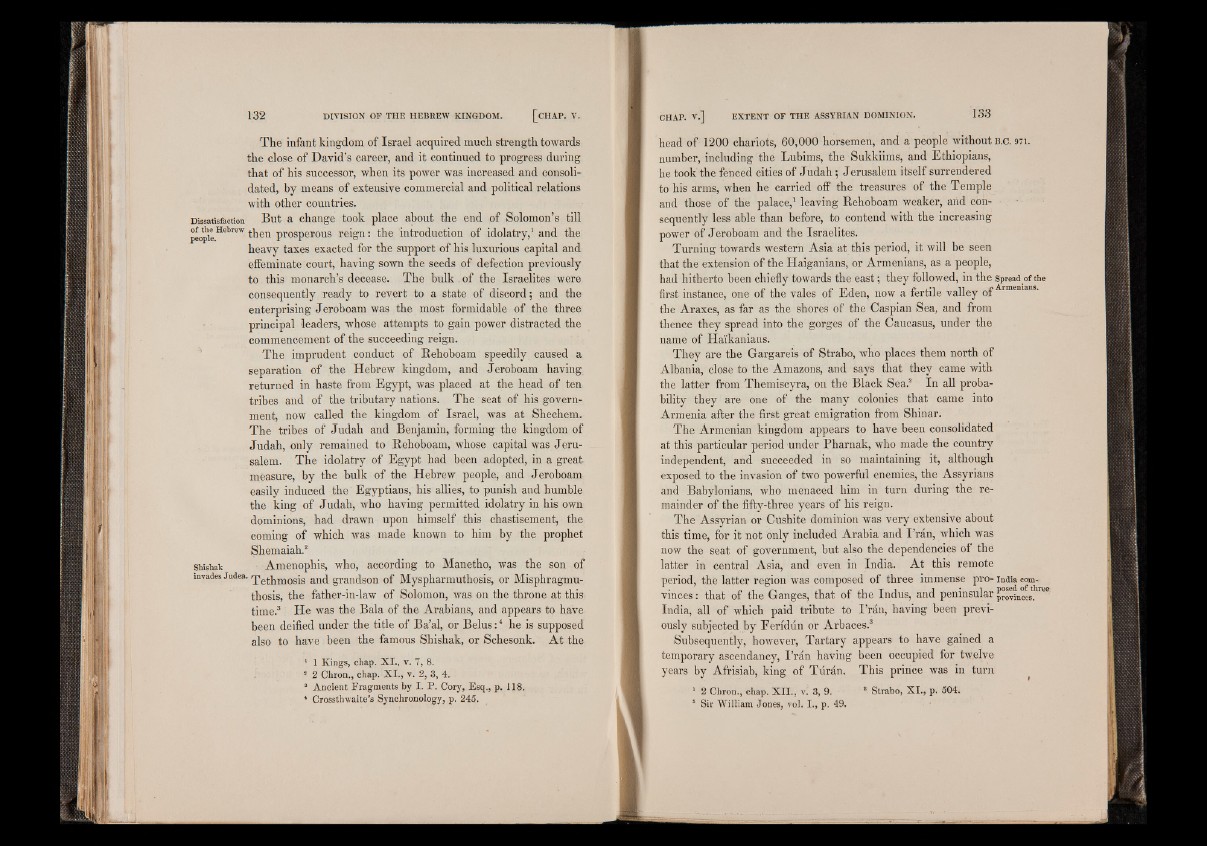
The infant kingdom of Israel acquired much strength towards
the close of David’s career, and it continued to progress during
that of his successor, when its power was increased and consolidated,
by means of extensive commercial and political relations
with other countries.
Dissatisfaction But a change took place about the end of Solomon’s till
peopleHebrewthen prosperous reign: the introduction of idolatry,1 and the
heavy taxes exacted for the support of his luxurious capital and
effeminate court, having sown the seeds of defection previously
to this monarch’s decease. The bulk of the Israelites were
consequently ready to revert to a state of discord; and the
enterprising Jeroboam was the most formidable of the three
principal leaders, whose attempts to gain power distracted the
commencement of the succeeding reign.
The imprudent conduct of Rehoboam speedily caused a
separation of the Hebrew kingdom, and Jeroboam having
returned in haste from Egypt, was placed at the head of ten
tribes and of the tributary nations. The seat of his government,
now called the kingdom of Israel, was at Shechem.
The tribes of Judah and Benjamin, forming the kingdom of
Judah, only remained to Rehoboam, whose capital was Jerusalem.
The idolatry of Egypt had been adopted, in a great
measure, by the bulk of the Hebrew people, and Jeroboam
easily induced the Egyptians, his allies, to punish and humble
the king of Judah, who having permitted idolatry in his own
dominions, had drawn upon himself this chastisement, the
coming of which was made known to him by the prophet
Shemaiah.8
Shishak Amenophis, who, according to Manetho, was the son of
unrades Judea. 'pet;pmosis and grandson of Myspharmuthosis, or Misphragmu-
thosis, the father-in-law of Solomon, was on the throne at this
time.3 He was the Bala of the Arabians, and appears to have
been deified under the title of Ba’al, or Belus:4 he is supposed
also to have been the famous Shishak, or Schesonk. At the
1 1 Kings, chap. X I., v. 7, 8.
. 2 2 Chron., chap. X I., v. 2, 3, 4.
3 Ancient Fragments by I. P . Cory, Esq., p. 118.
* Crossthwaite’s Synchronology, p. 245.
head of 1200 chariots, 60,000 horsemen, and a people without B.C. 971.
number, including the Lubims, the Sukkiims, and Ethiopians,
he took the fenced cities of Judah ; Jerusalem itself surrendered
to his arms, when he carried off the treasures of the Temple
and those of the palace,1 leaving Rehoboam weaker, and consequently
less able than before, to contend with the increasing
power of Jeroboam and the Israelites.
Turning towards western Asia at this period, it will be seen
that the extension of the Haiganians, or Armenians, as a people,
had hitherto been chiefly towards the east ; they followed, in the Spread of the
first instance, one of the vales of Eden, now a fertile valley o fArmemans-
the Araxes, as far as the shores of the Caspian Sea, and from
thence they spread into the gorges of the Caucasus, under the
name of Haikanians.
They are the Gargareis of Strabo, who places them north of
Albania, close to the Amazons, and says that they came with
the latter from Themiscyra, on the Black Sea.8 In all probability
they are one of the many colonies that came into
Armenia after the first great emigration from Shinar.
The Armenian kingdom appears to have been consolidated
at this particular period under Pharnak, who made the country
independent, and succeeded in so maintaining it, although
exposed to the invasion of two powerful enemies, the Assyrians
and Babylonians, who menaced him in turn during the remainder
of the fifty-three years of his reign.
The Assyrian or Cushite dominion was very extensive about
this time, for it not only included Arabia and I ’ran, which was
now the seat of government, but also the dependencies of the
latter in central Asia, and even in India. At this remote
period, thè latter region was composed of three immense pro- india com-
vinces : that of the Ganges, that of the Indus, and peninsular provinces?1™6
India, all of which paid tribute to I ’ràn, having been previously
subjected by Feridun or Arbaces.3
Subsequently, however, Tartary appears to have gained a
temporary ascendancy, I ’ran having been occupied for twelve
years by Afrisiab, king of Turan. This prince was in turn
1 2 Chron., chap. X I I ., v.' 3, 9. 3 Strabo, X I., p. 504.
3 Sir William Jones, vol. I.. t>. 49.